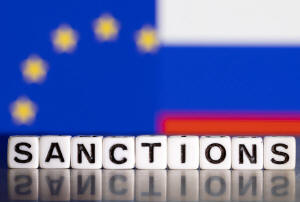EU to make breaking sanctions against Russia a crime, seizing assets
easier
 Send a link to a friend
Send a link to a friend
 [May 25, 2022] By
Jan Strupczewski [May 25, 2022] By
Jan Strupczewski
BRUSSELS (Reuters) - The European
Commission proposed on Wednesday to make breaking European Union
sanctions against Russia a crime, a move that would allow EU governments
to confiscate assets of companies and individuals that evade EU
restrictions against Moscow.
Breaking EU sanctions on Russia is now a criminal offence in 12 EU
countries. It is either an administrative or a criminal offence in 13
and two treat it only as an administrative offence, Justice Commissioner
Didier Reynders said. Penalties for sanction breaking across the EU vary
accordingly.
The Commission proposal aims to unify that approach to make sanctions
evasion a serious crime in all members of the 27-nation bloc, he told a
news conference.
"Today's proposals aim to ensure that the assets of individuals and
entities that violate the restrictive measures can be effectively
confiscated in the future," the Commission said in a statement.

The EU has so far frozen 10 billion euros in physical assets and more
than 20 billion euros in bank accounts of Russian oligarchs helping the
Kremlin's war effort in Ukraine.
But before these assets could be confiscated and sold off, the oligarchs
would first have to be convicted of either trying to evade sanctions or
of other crimes and the assets seized would have to be linked to that
crime only.
[to top of second column]
|

Plastic letters arranged to read "Sanctions" are placed in front the
flag colors of EU and Russia in this illustration taken February 28,
2022. REUTERS/Dado Ruvic/Illustration/File Photo

The new EU law, which has to be unanimously approved
by all EU governments and get a majority in the European Parliament,
would also penalise those who help break sanctions, like lawyers or
bankers working with those who circumvent restrictions.
The Commission also proposed to make it generally
easier to confiscate assets of criminals in the EU, making it
possible to impose an immediate freezing order to prevent the assets
from being moved, before a proper court order confirms it.
The Commission estimates annual revenues of criminal gangs in the EU
at 139 billion euros, only 2% of which become frozen by the
authorities. Only half of the frozen assets are later confiscated.
"With the new directive we will be much more efficient in that,"
Home Affairs Commissioner Ylva Johansson said.
Many EU countries lack sufficiently robust legal frameworks to seize
criminal assets, making it easier for criminals to hide their
resources and benefit from illegal activities.
(Reporting by Francesco Guarascio @fraguarascio; Editing by Tomasz
Janowski)
[© 2022 Thomson Reuters. All rights
reserved.]
This material may not be published,
broadcast, rewritten or redistributed.
Thompson Reuters is solely responsible for this content. |